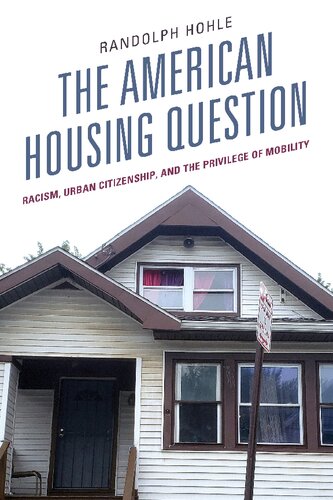

Most ebook files are in PDF format, so you can easily read them using various software such as Foxit Reader or directly on the Google Chrome browser.
Some ebook files are released by publishers in other formats such as .awz, .mobi, .epub, .fb2, etc. You may need to install specific software to read these formats on mobile/PC, such as Calibre.
Please read the tutorial at this link: https://ebookbell.com/faq
We offer FREE conversion to the popular formats you request; however, this may take some time. Therefore, right after payment, please email us, and we will try to provide the service as quickly as possible.
For some exceptional file formats or broken links (if any), please refrain from opening any disputes. Instead, email us first, and we will try to assist within a maximum of 6 hours.
EbookBell Team

4.4
52 reviewsThe American Housing Questionreframes the question of affordable housing through the concepts of urban citizenship and racism. Randolph Hohle argues that when we consider who benefits from affordable housing, we end up with a complex story of inclusion and exclusion and of privilege and mobility centered around race and social class. Historically, affordable housing’s underlying logic was to create the conditions for white people to exercise the privilege of mobility. Affordable housing policy was first and foremost about granting white people the ability to live in racially-segregated neighborhoods within and across urban areas. When the beneficiaries of affordable housing policy were predominately white, the state proceeded with a comprehensive and multifaceted plan to supply housing, including public housing, subsidizing the construction of market rate housing, rental vouchers, and rent control. The white response to the Civil Rights era – the precursor to neoliberal urban policy – privatized public housing, switched the responsibility to provide affordable housing to the market, and created the conditions for the financialization of housing in the twenty-first century that have made housing unaffordable for everyone. As the author aptly demonstrates, solving America’s housing question means addressing both racism and revaluing the notion of the public.